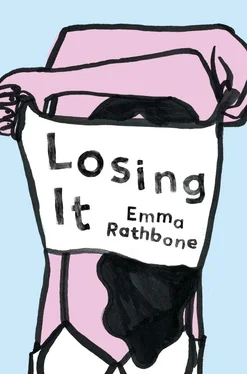1 ...7 8 9 11 12 13 ...48 “Yeah,” I said, impressed. “I will.”
Someone came up to us and said it was probably a good time to start thinking about serving the cupcakes and our conversation ended.
I talked to a few more people, and then wandered around a little with a cup of juice. I was studying some framed pressed flowers when I happened to look over and see Aunt Viv talking to a group of the women. She was holding up a decorative crystal goblet — the light glinted through it — and telling a story. She was talking quickly. Her hair was coming out of her braid a little, and her face was flushed. It was something funny; the people listening were giggling and paying close attention. I could see that in this context, with these women, she had a kind of power. She was presiding, divvying out attention and eye contact while they all stood around with open faces. Everyone burst out laughing at the same time, and she looked around in a happy, calculating way.
Later, in the car, I asked her about it.
“So you went to Bora Bora?”
“What?” she said, looking over at me, bemused.
“Didn’t you live there for a year?”
“Me?”
“Yeah. Karen said — about the coconut pantomime?”
“Oh.” She reddened. She became visibly flustered. She started messing with the radio dial and accidentally hit the turn signal, which started clicking.
“This thing ,” she said, annoyed, poking at it, and then the windshield wipers came on.
“So you went there?” I said, prompting her again, once she’d turned them off and a few moments had passed.
She nodded quickly without looking at me. The atmosphere in the car became warped and strange. We sat in silence the rest of the way.
It was only later that night, thinking back on the incident and trying to decipher her behavior that I realized what had happened. Aunt Viv had acted exactly like someone caught in a lie. She’d never gone to Bora Bora. She’d made up a story and then forgotten about it until I brought it up. I thought of the imperious way she presided over her friends at the party, how she basked in their admiration; her obvious pleasure as she conducted the moment, and the look of triumph on her face when they burst out laughing. I could see embellishing a little bit, but what kind of person would make up a story that outlandish completely out of nowhere? What did Viv want the world to think of her?
I stared at a colossal man named Ed Branch. He was like a mountain in a swivel chair. His huge face appeared to be melting, his cheeks sagging, the shiny skin under his eyes dripping down in two wide, flat drops. He was smiling at me in a jovial way. I took a sip from a glass of water on the heavy mahogany desk in front of me. There was a framed picture of an equally robust person — his wife, I assumed — caught unawares and laughing with a watering can, her face plump and happy, and I imagined they regularly had bawdy, baseboard-pounding sex, and then every once in a while she would watch him doing little boyish things, and her heart would burst.
And then there was Wes, sitting next to him. Wes seemed like a nice guy, too. He was young, grave, and ex-military. He had a knee-jerk politeness about him, old-fashioned and Southern. I wondered if that meant he’d be the same in bed, attentive to your every need with perfect decorum. Or maybe that consideration could turn cold and sharpen into cruelty. I wondered if this was something you could tell about a person.
“What was it you said you did at this Quartz Consulting?” said Ed. His hand absently wandered over to a nut bowl.
I was interviewing with them for a job at a firm called Kramer Branch, a week after I’d arrived in Durham. My third day there, with Viv gone again, the house quiet, I was stretched like a piano string. Everything had sputtered out — the essay I started writing; it was too hot to go for a walk. I tried reading in different rooms, but I couldn’t get into a book. I ended up in the sunroom, feeling half deranged, looking at a dusty craft manual on weaving. Finally, in defeat, I pulled over my laptop and started looking for part-time work. Plus, I thought, how was I ever even going to meet people? I needed to get out of this house and into town.
This job, part-time afternoon receptionist, was the first thing that had come up for which I looked remotely qualified, and I’d only have to come in after one o’clock every day.
“I facilitated communications by sourcing available online assets about solutions on higher education and applied them to a dynamic Web portal,” I said. “I was the social media pulse of the entire company.”
Wes and Ed looked at each other uncomfortably.
“Well,” said Ed, “what we really need here is someone to answer the phones for the afternoon shift. Run the odd errand.”
“I think I would thrive at that,” I said.
Two days later I was in my business clothes, making the twenty-minute drive back there for my first afternoon. The offices were in an old dry-goods store next to the train tracks, repurposed and outfitted with beige carpeting and wallboard and new windows in shiny plastic sashes. I walked inside, letting the glass door sigh shut behind me. Midday light came through some blinds and striped the floor. It was quiet except for an ambient electric drone. I looked around — maybe everyone had gone to lunch. I walked past a fraying taupe sofa and a glass coffee table with dingy magazines and up to the front desk, behind which was sitting one of the oldest people I’d ever seen in my life. She had sparse, short gray hair. She was wearing a patterned prairie dress with a frilly collar. Her face was an elaborate network of wrinkles and she looked wind-beaten, like she’d spent her life wandering through desert cliffs. She was trying to pull some cotton out of a huge bottle of vitamins, and her glasses were about to fall off her nose, and everything about her seemed to be teetering on the verge of disaster and I wasn’t sure if I should help or intervene in any way.
I stood there and waited for her to notice me. She teased out some strands of cotton.
“Excuse me?” I said. No response.
“Hello?” I said, and then, after a moment, “Can I help with that?”
Still nothing.
I stared at a plushy stuffed dog sitting up and hanging its legs over the edge of the table.
I was about to go knock on a door when I heard someone bustling down the stairs. It was a woman with a helmet of gray hair wearing flowing pastel vacation clothes. “Hi there,” she said. She arrived in front of me and extended her arm and about fifty bangles slid down. “You must be Julia.”
“Hi, yes,” I said, shaking her hand.
She turned to the old lady.
“Caroline,” she said.
Nothing.
“Caroline!” She banged on a desk bell a bunch of times.
The old lady looked up. “Jeannette,” she said loudly.
Jeannette took the vitamins from her and yanked out the cotton and gave them back. “This is Julia,” she said loudly. “She’s our new afternoon receptionist.”
“Hi,” I said.
We stared at each other.
Jeannette and I went up the stairs. “She’s James Kramer’s mother,” she said. She glanced at me sideways and rolled her eyes. “She used to be a judge. Down in Florida? Now she helps out around here.” And then, as an afterthought, as if she felt bad: “A lot of grit there. A lot of wisdom.”
“Sure,” I said.
We walked around and she pointed out all the things I would have to do each day. I was to keep track of the supply closet, water the plants, make sure the conference rooms were ready when there was going to be a meeting by putting coffee out, answer the phones at the front desk for a few hours, dust a row of glass clocks that were awarded at a yearly conference, run a package up to the titles office on Green Street now and then, and other low-grade tasks. Since there wasn’t much to say about the job, most of our conversation centered around the cruise Jeannette had just taken with her husband.
Читать дальше
Конец ознакомительного отрывка
Купить книгу












